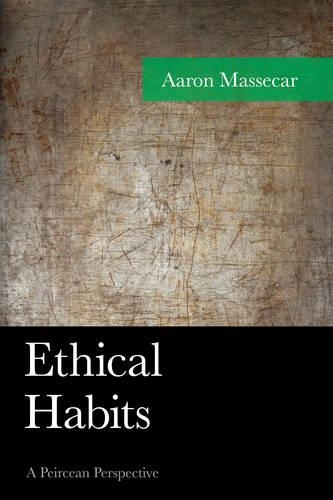
Ethical Habits: A Peircean Perspective
(Hardback)
Publishing Details
Ethical Habits: A Peircean Perspective
By (Author) Aaron Massecar
Bloomsbury Publishing PLC
Lexington Books
21st April 2016
United States
Classifications
Professional and Scholarly
Non Fiction
170
Physical Properties
Hardback
176
Width 159mm, Height 239mm, Spine 20mm
458g
Description
Previous attempts to set up an Ethics based on the writings of Charles S. Peirce have generally begun and ended with the 1898 lecture, Philosophy and the Conduct of Life. It was in that lecture that Peirce famously argued that Theory and Practice should be kept distinct. In Ethical Habits: A Peircean Perspective, Aaron Massecar argues that this lecture opens up a uniquely Peircean Ethics that brings theory into practice through an ethics of intelligently formed habits.
Reviews
In Ethical Habits: A Peircean Perspective, Aaron Massecar has taken on the worthwhile adventure of seeing how Peirces normative (theoretical) ethics might be put to work. He explores a wide range of Peircean texts to make his case for critical self-control in the development of human habits. The result is a persuasive story that reveals the nuances in Peirces thought and shows a creative dimension in establishing our moral habits and in pursuing human virtues. The Aristotelian-influenced Peirce of Massecars work is quite unlike the mechanical, deliberative Peirce others have promoted. Massecars work provides a nice opening for those who want to explore all of Peirces normative sciences for their everyday usefulness. And as an historical approach to the ethics of the pragmatists, this book makes a nice companion to Gregory Pappass John Deweys Ethics. -- Doug Anderson, Southern Illinois University Carbondale
No creative appropriation of a commonplace concept more dramatically reveals the fecundity of Peirce's philosophical genius or the scope of his theoretical imagination than his treatment of habit. Aaron Massecar's probing, critical engagement with Peirce's appropriation of this concept weaves together seemingly disparate concerns and fields (e.g., cosmology, psychology, and ethics) and exhibits unnoticed connections. His systematic, detailed, and nuanced study of Peirce on habit is a contribution to both Peirce scholarship and, of even greater significance, contemporary philosophy more generally. -- Vincent Colapietro, Pennsylvania State University
Setting out from a novel appraisal of C. S. Peirces controversial separation between theory and practicean apparent dualism that has perplexed many a reader of the founder of pragmatism over the yearsAaron Massecar sketches a dynamic conception of ethics rooted in the activity of habit formation and revision. This serves as a useful corrective to interpretations that overstate the role of theory and reason in Peircean ethics, and opens up the field for a re-evaluation of the role of practice, tradition, and sentiment in normative inquiry. The significance of these results reaches well beyond mere exegesis, implying vital connections between Peirces conception of normative science and virtue ethics as well as revealing new possibilities for applying his thought in humanistic and social research. -- Mats Bergman, University of Helsinki
Author Bio
Aaron Massecar is an independent scholar and consultant.
